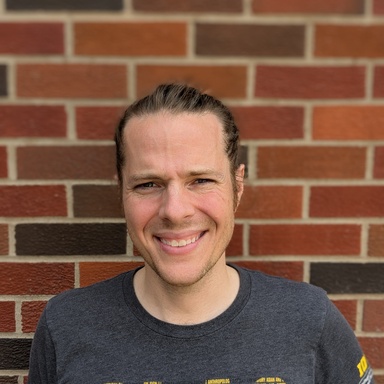By Fatima Salinas
As internship director in the Department of Health and Human Physiology, Ben Landsee is able to bring together his dedication to student success and his passion for career development.

Landsee saw the role as the perfect fit to merge his advising experience with his enthusiasm for helping students grow professionally.
Previously, Landsee worked for the Academic Advising Center, with pre-health and health and human physiology students. Landsee also worked closely with students in philosophy, anthropology, ethics and public policy, enterprise leadership, and museum studies. He's also taught classes through the Career Leadership Academy.
Any students or alumni looking to get in touch with Landsee can reach him by email at benjamin-landsee@uiowa.edu. Read below about Landsee’s career, the value of experiential learning, and his advice to students.
What made you excited to step into the role of internship director for HHP?
The job was a good fit for not only my experience but also my interests and values. I talk a lot with students about exploring what is important to them and then exploring how to connect their work with those things and in this role, I get to do a lot of that. Community and connections are major values for me, and this role allows me to constantly work toward them. I also take a lot of joy out of talking with students about the intersection between personal and professional growth, and this job gives me so many opportunities to do that!
What do you think makes internships such a valuable part of the student experience, especially in a department like HHP?
Internships give students a beautiful opportunity to challenge themselves and do some self-exploration, all while developing skills and knowledge that can help make the uncertain future a bit easier to accept. These are great experiences to help students explore what different careers or fields feel like, connect what they have learned in classes to non-academic settings, and develop meaningful interpersonal skills.
How do you support students throughout the internship process, from planning to placement to reflection?
It begins with helping students make what they want the center of the process—how they want to grow, the opportunities they want to have. Once students identify sites they are interested in, I support students' outreach efforts to sites and work with them and site supervisors to define the role they will play at the site. If students are earning credit for their internships, they will be enrolled in one of my courses, which is designed around reflection.
What’s your biggest piece of advice for students who want to stand out and make the most of their internship?
The final assignment for the internship and practicum courses asks students what advice they would give to themselves at the start of their internship if they could and almost every student says some version of trusting yourself and getting involved as soon as you can. I would add not to be afraid of “mistakes”. You can’t learn anything useful without making them. See them as part of the learning process rather than an outcome.
What are your hopes or goals for the internship program in the next year or two?
I hope to keep finding new community partners. I am hoping to have more opportunities in nutrition and dietetics, while also continuing to find more clinical sites. In addition, I want to have more connections available across the country in the summer.